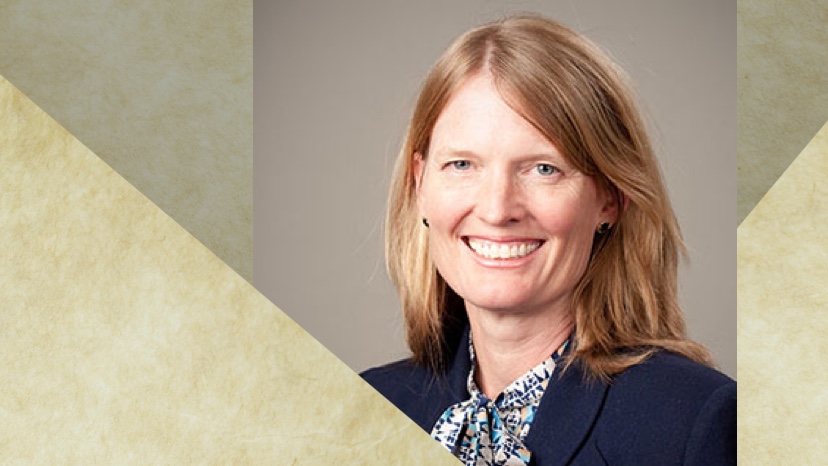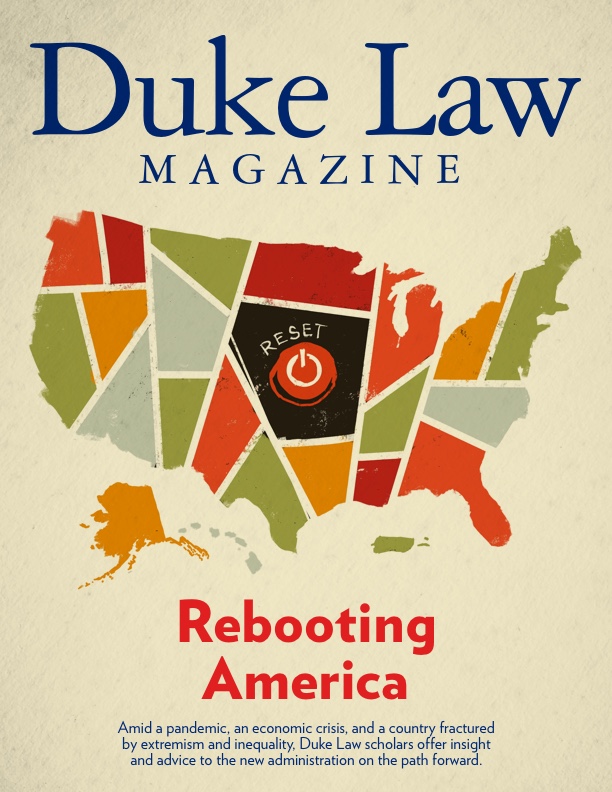Sarah Ludington JD/MA ’92 takes helm of First Amendment Clinic
A First Amendment and information privacy scholar, Ludington joined the faculty in July as a clinical professor and clinic director.

Sarah Hutt Ludington JD/MA ’92 joined Duke Law July 1 as clinical professor of law and director of the First Amendment Clinic.
A faculty member since 2009 at Campbell Law School where she taught constitutional law, civil procedure, First Amendment, information privacy, and administrative law, Ludington also served as the school’s associate dean for academic affairs for three academic years. She received the Dean’s Award for Excellence in Teaching in 2015, the same year she earned tenure, and was voted Administrator of the Year by students in 2019.
Ludington was a visiting assistant professor at North Carolina Central University School of Law during the 2008-2009 academic year. From 2001 to 2008 she was a senior lecturing fellow at Duke Law, teaching Legal Analysis, Research, and Writing.
“Sarah brings her longstanding expertise in the First Amendment, her wealth of teaching experience, and her mature administrative skills to the First Amendment Clinic,” said Jane Wettach, the William B. McGuire Clinical Professor Emerita of Law and founding director of the Children’s Law Clinic.
“Those of us who knew her when she studied and worked at Duke Law previously welcomed her back with open arms. Those who are getting to know her for the first time will undoubtedly soon come to admire her many talents.”
Ludington took over leadership of the clinic from its founding director, Professor H. Jefferson Powell, a renowned scholar of constitutional law who launched the clinic in 2018 and remains on the governing faculty.
Ludington, who practiced libel defense litigation, said she is impressed with the growth of clinical education at Duke Law since she left and noted that the clinical faculty includes her classmates Sean Andrussier ’92, director of the Appellate Litigation Clinic, and Michelle Nowlin JD/MA ’92, co-director, with Ryke Longest, of the Environmental Law and Policy Clinic.
“I’m so proud of my alma mater because of everything it’s done to improve clinical offerings, the legal writing curriculum, and the entire skills curriculum,” Ludington said when her hire was announced. “The clinical setting is where learning gets translated into practice.”
Ludington earned her bachelor’s degree cum laude from Yale University, where she majored in English. She graduated with high honors from Duke Law, where she was a member of the Order of the Coif, served as note editor for Duke Law Journal, and won the Hervey M. Johnson Writing Prize for best student note and the American Jurisprudence Award for Constitutional Law. Simultaneously, she earned a master’s degree in English.
After graduating from Duke Law, Ludington clerked for Judge Harry T. Edwards of the U.S. Court of Appeals for the District of Columbia and for Judge Joyce Hens Green of the U.S. District Court for the District of Columbia. She then practiced law at Miller, Cassidy, Larroca & Lewin in Washington, D.C., and Lankenau, Kovner & Kurtz in New York.
Returning to North Carolina in 1995, Ludington taught English for seven years at schools including Durham Academy where, at a parents function, she had a chance meeting with then-Dean Katharine Bartlett, now the A. Kenneth Pye Professor Emerita of Law. Bartlett encouraged her to apply to Duke Law as a writing teacher, and for the next seven years Ludington taught LARW, as well as a privacy law seminar and a semester of First Amendment law co-taught with Douglas B. Maggs Professor of Law Stuart Benjamin.
During that period, in which three large data security breaches exposed the personal data of hundreds of thousands of people, Ludington wrote “Reining in the Data Traders: A Tort for the Misuse of Personal Information,” 66 Maryland Law Review (2007), which proposes a new common law remedy for individuals “who have suffered harm to their core privacy interests of choice and control — choice about who may receive their information, control over the information revealed, and how the recipient of that information may use it.” She said she hopes to write an update to that paper.
“I had encountered a fair amount of privacy law in the context of practice and I became interested and started writing about it at a time when ‘big data’ and data privacy itself was an emerging issue,” she said. “European data laws were going into effect and America had nothing equivalent. People were trying to tease out how to resolve privacy concerns given the new technology capable of collecting tons of data about us. And many of the legal issues still haven’t been resolved.”
Her scholarship also includes “Aiming at the Wrong Target: The ‘Audience Targeting’ Test for Personal Jurisdiction in Internet Defamation Cases,” 73 Ohio State Law Journal (2012), in which she argued that the jurisdictional test adopted by North Carolina and other states in online defamation cases was flawed, and recommended using minimum contacts analysis instead.
She also has collaborated with Professor Mitu Gulati on two works: “A Convenient Untruth: Fact and Fantasy in the Doctrine of Odious Debts,” 48 Virginia Journal of International Law (2008) and “Applied Legal History: Demystifying the Doctrine of Odious Debts,” 11 Theoretical Inquiries in Law (2010), also authored with Alfred L. Brophy.
“Sarah is one of my favorite co-authors,” said Gulati. “She has an infectious energy and curiosity that make working on a research project with her akin to an Indiana Jones adventure. At least, that was what it was like searching archival records in obscure museums, antique stores, and libraries around the world when we were attempting to unearth the truth behind what we discovered to be a largely false legend about the odious debts doctrine.
“Duke is fortunate to have been able to lure her back. She inspired me and I know she will be an inspiration to the students.”
Under the supervision of Powell and Lecturing Fellow and Supervising Attorney Nicole Ligon ’16, First Amendment Clinic students have represented clients in a range of matters implicating the rights of free speech, including political speech and alleged defamation stemming from comments on social media and the barring of journalists from reporting activities. In April 2020 the clinic secured summary judgment in a South Carolina federal defamation case in which its client was sued for more than $110 million in damages for comments he made online criticizing those behind a proposed rezoning in his town. The clinic also has filed several amicus briefs with the U.S. Supreme Court, most recently in support of a certiorari petition in Mckesson v. Doe, a case that concerns whether a protest organizer can be held personally liable for the actions of participant. The Supreme Court granted certiorari in this case in November and remanded it to the Fifth Circuit, instructing the appellate court to inquire into whether the Louisiana Supreme Court allows for negligence liability to attach in this case under state law.
Demand for clinic services far exceeded Powell’s expectations in the clinic’s first two years. “There are far more people than I imagined who have issues, concerns, problems that relate to freedom of expression and need to find reliable advice, assistance and legal representation,” he said.
“Instead of not having enough to do, we have been continuously busy, we have repeatedly had to turn down meritorious matters because of lack of capacity, and we have been able to give our students exposure to a full range of First Amendment-related litigation and advice-giving.
“Given the great need, the remarkably talented students the clinic attracts, and the great value of clinical education generally, I believe the First Amendment Clinic has a bright future under Sarah and Nicole’s leadership.”
In addition to its core mission of defamation defense, Ludington plans to expand the clinic’s engagement with local news outlets on libel defense and engage clients who have been blocked from public officials’ social media feeds. She also plans to develop policy initiatives such as advocating for an anti-SLAPP statute in North Carolina. (SLAPP — strategic lawsuit against public participation — generally refers to a libel suit filed by relatively more powerful parties, such as a public official or wealthy individual, against relatively less powerful parties with the intent of stifling criticism by forcing the defendant to incur the cost of legal representation.)
Ludington described her new role at Duke Law as a career capstone.
“It brings together a subject that I love and am passionate about, an institution that I love and am incredibly proud to be associated with, and a style of teaching that I’m eager to master on behalf of the wonderful, talented students that go to the Law School,” she said.

